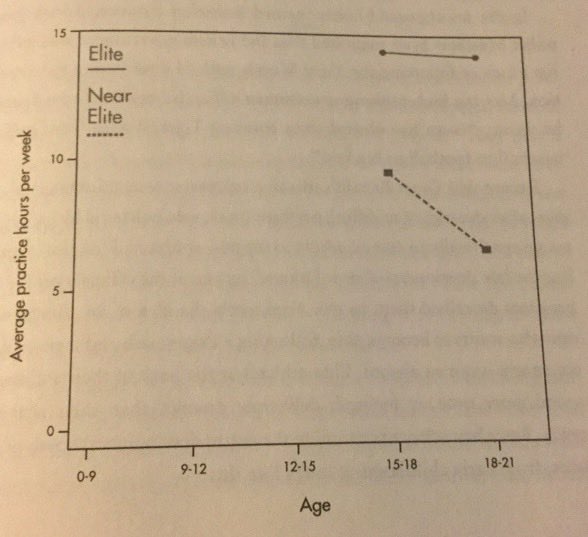From Eric Barker's
https://www.bakadesuyo.com/2019/05/kids-successful/
This Is How To Make Your Kids Successful: 4 Secrets From Research
You want your kids to grow up and be more than just… older. You want them to be successful and fulfilled.
What’s the latest we’ve been hearing? 10,000 hours of deliberate practice, grit, early specialization, tiger moms…
Are you skeptical about any of these? Good, you’ve come to the right place. (Here, take a seat next to me.) Luckily, someone has done the research and has clear answers for us…
The estimable
David Epstein, author of the excellent NYT bestseller
The Sports Gene, has a new book out that turns a number of these ideas on their head. (And he’s not just a fantastic author – he’s also a new father.)
Okay, so you want your kids to be successful, happy, and as cool as the other side of the pillow?
Let’s get to it…
1And there’s no doubt — the elites do spend more time on deliberate practice than non-elites. You know it must be true because I have a chart:
Because there’s another athlete’s story you don’t hear as much. This kid didn’t relentlessly focus on one sport. He was skiing, wrestling, swimming, skateboarding, playing basketball, handball, badminton and soccer.
He tried everything and was serious about nothing. It wasn’t until his teens that he started to focus on tennis…But that kid became Roger Federer.
And it turns out that the Roger path is actually much more common than the Tiger path. At young ages, Tiger is the exception, not the rule, among elites:
Eventual elites typically devote less time early on to deliberate practice in the activity in which they will eventually become experts. Instead, they undergo what researchers call a “sampling period.” They play a variety of sports, usually in an unstructured or lightly structured environment; they gain a range of physical proficiencies from which they can later draw; they learn about their abilities and proclivities; and only later do they focus in and ramp up technical practice in one area.
Yeah, but that might only be true of sports, right? Nope. Same pattern is evident in music.
…the students classified as exceptional by the school came from less musically active families compared to less accomplished students, did not start playing at a younger age, were less likely to have had an instrument in the home at a very young age, had taken fewer lessons prior to entering the school, and had simply practiced less overall before arriving – a lot less.
And what were the best music students like? They “turn out to be those children who distributed their effort more evenly across three instruments.” Again, more Roger, less Tiger.
10,000 hours is good. But they don’t have to happen between ages 0-10. In fact, they shouldn’t.
2) Real Learning Is Slow And Frustrating
I’ll repeat that: “the problem might be that kids are doing too well in school.”
Good grades are wonderful. But if they’re coming fast and easy, chances are your kid isn’t really learning all that much that they’re really going to retain. The research is clear: to really learn, studying must be hard. They even have a clever name for this: “desirable difficulties.”
“Some people argue that part of the reason U.S. students don’t do as well on international measures of high school knowledge is that they’re doing too well in class,” Nate Kornell, a cognitive psychologist at Williams College told me. “What you want is to make it easy to make it hard.” Kornell was explaining the concept of “desirable difficulties,” obstacles that make learning more challenging, slower, and more frustrating in the short term, but better in the long term.
So good performance early can be bad. Sound crazy? Oh, it gets crazier… As a corollary, “great” teachers are often terrible.
How many times did you cram for a test, do fine, but then 24 hours later you couldn’t remember a single thing you studied? Exactly.
That wasn’t early onset dementia. Studies show learning too fast or too easy doesn’t stick. Struggling is essential. In fact, trying hard and being wrong can be better than initially being right.
In one of Kornell’s experiments, participants were made to learn pairs of words and later tested on recall. At test time, they did the best with pairs that they learned via practice questions, even if they had gotten the answers on those quizzes wrong. Struggling to retrieve information primes the brain for subsequent learning, even when the retrieval itself is unsuccessful.
Yes, it’s very impressive to have a kid easily getting all A’s. But if you really want your child to grow up to be a top performer, you don’t want your kid to be a prodigy.
3) Too Much Specialization Makes You Narrow
…And that is what a rapidly changing, wicked world demands – conceptual reasoning skills that can connect new ideas and work across contexts. Faced with any problem they had not directly experienced before, the remote villagers were completely lost. That is not an option for us. The more constrained and repetitive a challenge, the more likely it will be automated, while great rewards will accrue to those who can take conceptual knowledge from one problem and apply it in an utterly new one.
Kids need to learn a variety of things and how to make connections between them.
Modern work demands knowledge transfer: the ability to apply knowledge to new situations and different domains… Research on thousands of adults in six industrializing nations found that exposure to modern work with self-directed problem solving and nonrepetitive challenges was correlated with being “cognitively flexible.”
4) When You’re Young, Quit May Be Better Than Grit.
Being a bit flaky can be good, especially when you’re young, because it gives you the chance to learn about yourself in different environments. As London Business School professor Herminia Ibarra says, “Be a flirt with your possible selves.”
Sum Up
Here’s how to make your kids successful:
- Children need a sampling period: Raise your kids like a Roger, not a Tiger.
- Real learning is slow and frustrating: I have deprived you of lasting knowledge by making this easy to read and the guilt is overwhelming.
- Too much specialization can make you narrow: A one-trick pony often becomes a very dumb, boring, unsuccessful horse.
- When you’re young, quit may be better than grit: Skip the youthful mistakes and they become middle-aged mistakes — where they’re a lot more costly.
This post is focused on kids because that’s where this knowledge is most useful. But let me tell you a little secret…
It all applies to you too. Keep sampling. Keep learning. Don’t get narrow. Don’t be afraid to quit something that isn’t working and try something new.

 From
From